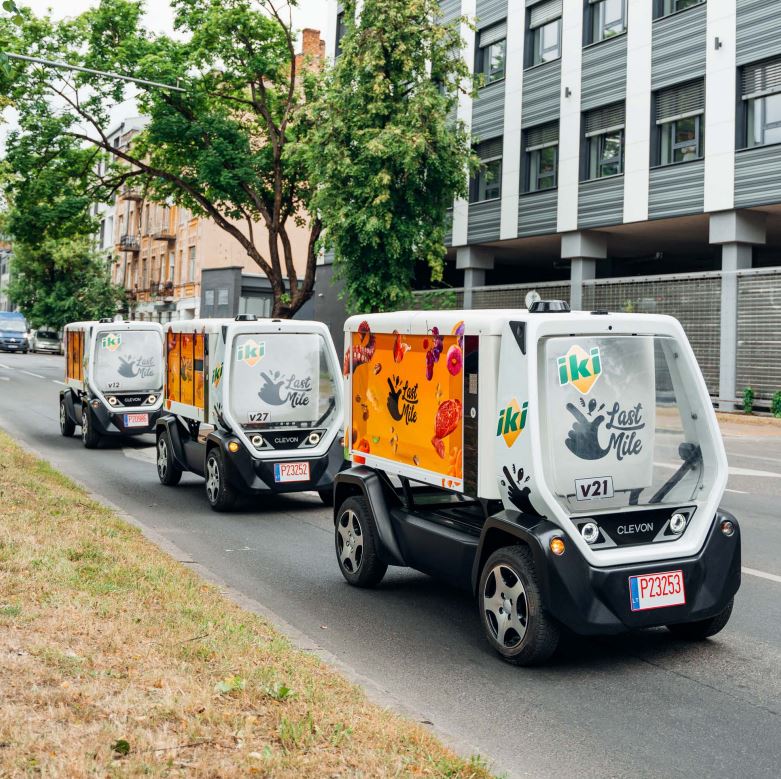The future of home shopping delivery is clearly linked to autonomous technologies. Lithuania is not chasing others in this field, but is rather taking a lead that brings useful insights for the whole market. In Vilnius, fleets of delivery robots have joined already the busy city center traffic for the first time in Europe. According to Tadas Noruskaitis, CEO and co-founder of LastMile, the startup that implemented the project, the decision to entrust shopping to robots has paid off, showing what already works and what could be improved.
In 2022, the first LastMile fleet of delivery robot rolled into Vilnius’ Balsiai district. Less than a year later, three robots appeared in the center of the capital, becoming the first trio of robot couriers to operate as fully-fledged vehicles on the city’s central streets.
The pilot project, with Vilnius at its heart, was not only a significant milestone for delivery services in Europe, but also a useful lesson in efficiency, sustainability and technological integration. Most importantly, it confirmed that Lithuania has created a favorable environment for trade innovation. It is viewed favorably by public authorities, and business partners and buyers are hungry for innovations that can then be adapted to other markets”, – says T. Norušaitis.
The statistics are telling: in 136 days, fleets of delivery robotscovered over 5,000 km, or a distance equivalent to a trip from Vilnius around the Baltic Sea. The robots have not been involved in a single traffic incident and have delivered over 500 purchases, with a daily record of 18 deliveries.
A complete solution to 3 modern problems
Increased efficiency, driver shortages and the need for environmentally friendly delivery solutions are some of the key factors driving the search for innovative logistics solutions.
Retail in general is full of complex challenges, and it is not often that one solution can solve several of them at once. Autonomous vehicles have helped us to simplify and reduce the cost of delivery operations and have confirmed that we will be able to alleviate labor shortages in the future. We have also proved that home delivery can be both convenient and sustainable. Electric motors not only mean zero emissions, but also less noise pollution, which is an equally acute problem in cities,” says Norušaitis.
Progress in the legal framework
According to LastMile’s CEO, the first steps of autonomous delivery robots required not only technological expertise, but also an update of Lithuania’s legal regulatory framework.
This is something that all countries are facing – the rules need to be adapted to fit the practicalities of deploying autonomous vehicles on public roads. After all, in the past, such cars simply did not exist, and we cared only about registration and insurance. We are pleased that the Ministry of Transport and Communications has taken into account the new needs, and, in
cooperation, we have quickly prepared the legal framework for future projects,” says T. Norušaitis.
Ensuring the safety of new vehicles is a key challenge for regulatory change. Even on busy streets and in often congested and built-up backyards, autonomous cars have not been involved in a single safety incident.
It has certainly paid off that we have not jumped headfirst into an experiment. First, we tested the robots in the more remote, less busy area of Balsiai. Once we were convinced of their practicality and their ability to move efficiently in suburban areas, only then could we calmly start planning a new phase and enter the streets of the capital city center,” notes Norušaitis.
Successful integration led to entry into the US market
Three parties worked closely together in the practical implementation of the fleets of delivery robotsproject: the robot developers Clevon, the supermarket chain Iki, which delivered the purchases to the customers, and LastMile, which developed the platform for the project.
We adapted the planning software we developed to a vehicle-specific management system. This integration facilitated real-time updates of orders and delivery logistics, allowing efficient route planning,” says Norušaitis.
The key here was the dynamic exchange of information on robot availability, order sizes, customer locations, PIN codes, etc. The CEO of the start-up admits that there were some initial glitches in the system, but this allowed him to discover more efficient solutions and to see the potential of integrated e-commerce.
We have proven in practice that there are no technical barriers to operating from different countries and that we can adapt the software we develop to different needs. This has proved to be true in Lithuania and has become an incentive to expand our activities. We have already entered the US market, where we offer our platform as a personalized IT solution for home delivery of food from restaurants. We are also taking on new projects in Germany, Romania and have concrete plans for Austria,” says Norušaitis.
Proving the potential for future prospects
A new era in urban logistics has not gone unnoticed. “LastMile was named Innovation of the Year at the Green Transport Awards, while Vilnius has also received international attention for making solid progress in the field of autonomous robots. But according to Noruskaitis, the most valuable part was the opportunities to discover where to improve such delivery and the feedback from customers.
Our trial has shown that both the infrastructure and Lithuanian buyers are ready for autonomous innovation. It is only here that customer trust is crucial. Customers got to know the innovation gradually, they needed to get used to the idea of picking up a parcel from a robot and not directly from a courier. That’s why we will continue to adapt our software to different delivery methods,” says the start-up’s CEO.
LastMile’s telephone survey showed that over 95% of respondents found the robot courier easy to use. They praised the clarity and ease of use of the service, appreciated the new approach to delivery, and were unanimously satisfied with the freshness and condition of the delivered goods.



![[CITYPNG.COM]White Google Play PlayStore Logo – 1500×1500](https://startupnews.fyi/wp-content/uploads/2025/08/CITYPNG.COMWhite-Google-Play-PlayStore-Logo-1500x1500-1-630x630.png)